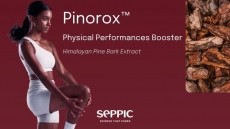Chinese research links schisandra extract to reduced risk of non-alcoholic fatty liver

Researchers from the Second Military Medical University in Shanghai analyzed how supplementation of a traditional Wuzhi capsule, an ethanol extract of dried Schisandra sphenanthera berry popularly used in China, may influence the development of non-alcoholic fatty liver disease, or NAFLD, in mice.
Extract of S. sphenanthera has been used as a medicinal herb in China and is now indexed in the country’s official Pharmacopoeia of the People’s Republic of China, the authors wrote. The extract in a Wuzhi capsule form is registered as a drug in China, and is widely used to treat liver dysfunction, they added.
For their most recent study, they fed mice a diet low in methionine and choline to induce NAFLD, and then supplemented some of the mice with schisandra extract, similar to what is found in a Wuzhi capsule.
After five weeks of supplementation, they observed significantly less steatosis, inflammation, and necrosis in the liver of mice given the extract compared to mice who did not receive it, leading them to argue that Wuzhi plays a Protective role against methionine-choline-deficient-induced steatohepatitis.”
Their observations appear in the February 2019 edition of the journal Biomedicine & Pharmacotherapy.
Study details and results
The researchers were building on previous studies on Wuzhi, which have linked it to protection against acute hepatotoxicity and modulation of liver function.
They fed 80 mice the NAFLD-inducing diet, while the control group of mice received a standard diet supplemented with methionine and choline.
For the intervention group of mice, they supplemented powder used in Wuzhi capsules, purchased from Hezheng Pharmaceutical Company in China. Then, they divided the mice into more groups, each receiving a different dose of Wuzhi, ranging from 50/mg/kg/day to 1,000/mg/kg/day.
After the intervention period of five weeks, they analyzed the mice’s liver tissue. They found that, among mice fed a diet to induce NAFLD, those that received 250 mg/kg/day exhibited attenuated damage in liver health biomarkers.
Join us for our upcoming FREE Liver Health webinar on February 2018
- Thursday, February 28 at 1 PM EST
- Duration: 60 Minutes
- LIVE Q&A session
- Experts from Gaia Herbs, Kaiviti Consulting, and The Think Healthy Group
From botanical blends to microbiome interventions, there is plenty of interest in better understanding how to support liver function. Join NutraIngredients-USA as we explore this topic with leading brands and industry stakeholders. CLICK HERE TO REGISTER
Source: Biomedicine & Pharmacotherapy
Published online ahead of print, https://doi.org/10.1016/j.biopha.2018.11.069
“Wuzhi capsule (Schisandra Sphenanthera extract) attenuates liver steatosis and inflammation during non-alcoholic fatty liver disease development”
Authors: Ziqi Chen
















